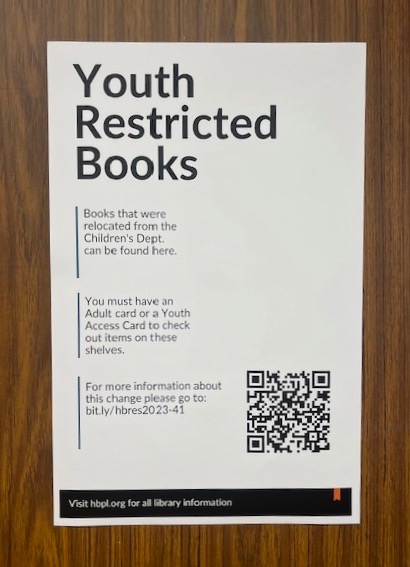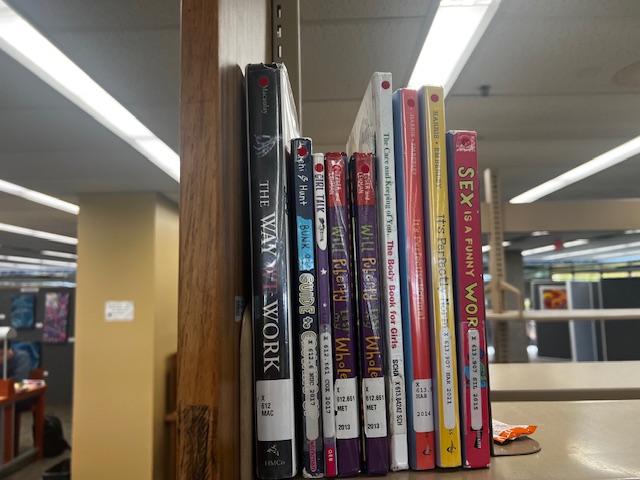The gallery in the Orange County Superior Court Department C24 was silent after the final gavel last Friday morning, until the chief plaintiff Erin Spivey half rose from her second-row seat, turned and said, “We won, you guys. We won!”
Then we cheered and clapped.
Judge Lindsey E. Martinez ruled Huntington Beach can’t prohibit people under 18 from accessing library books because the city council thinks they contain sexual content.
What books does the city deem off limits without a parent’s signature? They’ve included Everybody Poops, Your One and Only Heart and The Way We Work: The Amazing Human Body.
 Sign on the fourth floor as of September 5th Credit Carol Duas
Sign on the fourth floor as of September 5th Credit Carol Duas
On the “Youth Restricted” shelf that Friday were nine books, including Will Puberty Last My Whole Life?, The Body Book for Girls, It’s Perfectly Normal and Sex is a Funny Word.
Additionally, another 38 books were pulled from the library shelves this June “for review” when Carla Strickland and Huntington Beach Republican Women challenged them, thus “protecting our children’s eyes and minds” and keeping them “safe from sexualized content.”
Among the disappeared books was an eight-page board book called Pride Puppy! about a pet who is lost and then returned to its family by a caring community at a Pride Day parade. Twenty-four pulled books are Young Adult titles and one is an adult book Call Me by Your Name, also a Netflix movie.
Though a book may make you uncomfortable, you should not be able to keep others from reading it. Pride Puppy! Included.
I wasn’t cheering for any particular book. I was cheering for at least two reasons.
The first has to do with my experience teaching high school.
I’ve had in my sophomore honors English class students who were already parents, bright, well-spoken kids from loving families. If my math is correct, their child was conceived during eighth grade. It is not wise to require students to wait until 18 to access information about their bodies.
I’ve also seen students in anguish, suffering depression, cutting themselves, making bad choices and certainly not paying attention to my “Julius Caesar” lessons because they were dealing with issues some would call sexual. They need more information, not less.
Even one youth suicide is one too many. I mourn more than one.
Professional librarians are trained to make information available to young people, but only when they are allowed to do their jobs.
The second reason I cheered is for the rule of law, in this case California’s Freedom to Read Act and the First Amendment.
A word about the First Amendment. It is highly unlikely you can violate my First Amendment rights. You can unfriend me, say bad things about me on Nextdoor.com, gossip, refuse to patronize my business and ban me from your home, but you probably cannot violate my First Amendment rights.
Why not? Because the First Amendment restrains only government. Our Founding Fathers knew it was the government that would be the danger to our liberty.
Congress shall make no law respecting an establishment of religion, or prohibiting the free exercise thereof; or abridging the freedom of speech, or of the press; or the right of the people peaceably to assemble, and to petition the Government for a redress of grievances.
The courts hold the right to information is linked to the right to speak, to hear all sides and make up our minds without government limitations.
Since 1963 the courts have held that states, counties, school districts and even city councils are also restrained by the First Amendment. They shall not make laws or policies that restrict access to information based on content or viewpoint.
The legal system is prepared to deal with libel, slander, sexual exploitation, provocation to violence and indecency in public spaces. Those are different issues.
The California Freedom to Read Act ensures libraries using public funds cannot restrict access to books based on their content or the age of the reader.
Judge Martinez found Huntington Beach city council is violating the Freedom to Read Act. They are clearly also violating the First Amendment.
What comes next in this case?
In thirty days, the plaintiffs’ lawyers will hand the judge a list of corrective actions the city must take to reverse their violation. The city may well be told to pay all the plaintiff’s legal costs. That will be no small amount.
The city may do one of several things. It can appeal the decision within thirty days and thereby add additional legal expenses.
It can comply with the judge’s ruling.
It can ignore the judge’s orders and face penalties, many potentially financial.
Who is it that will pay these penalties? Perhaps the city has a magical friend, a sort of Daddy Warbucks, who underwrites the city’s legal expenses when they challenge existing laws. Perhaps their peculiar positions do not affect the city’s coffers.
But it is much more likely that the citizens of Huntington Beach will be the ones who will pay.
Janet Ewell is a retired educator and a longtime resident of Huntington Beach. She is an advocate for student First Amendment rights, the author of high school journalism textbook, a parent and grandparent.
Opinions expressed in community opinion pieces belong to the authors and not Voice of OC.
Voice of OC is interested in hearing different perspectives and voices. If you want to weigh in on this issue or others please email opinions@voiceofoc.org.
Related

